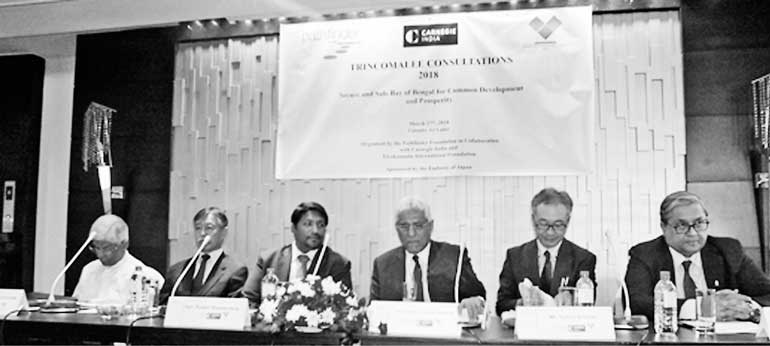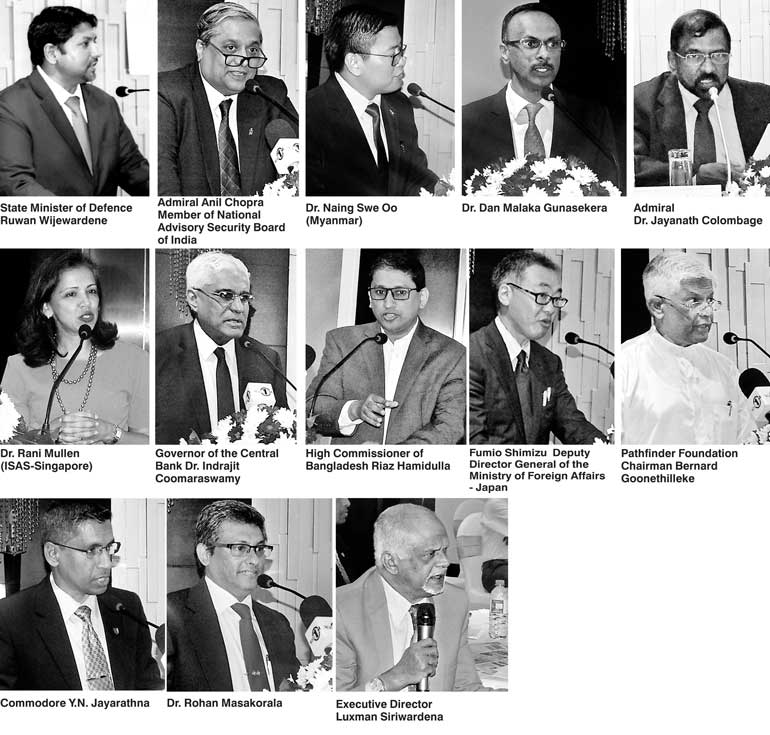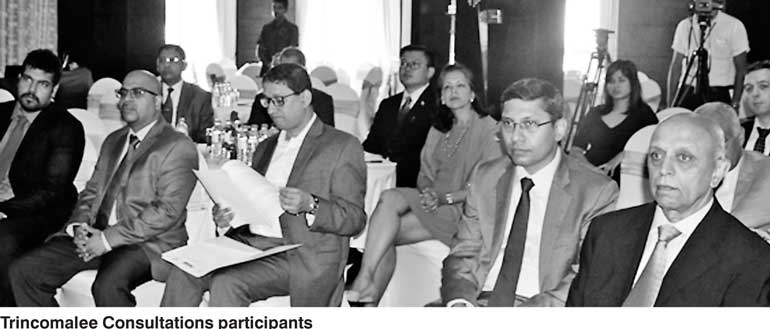Thursday Feb 26, 2026
Thursday Feb 26, 2026
Saturday, 31 March 2018 00:07 - - {{hitsCtrl.values.hits}}

Following the successful first regional conference held in 2017 under the theme ‘Regional Cooperation for Economic Prosperity and Maritime Security in the Bay of Bengal’, Trincomalee Consultations – 2018’ was conducted by The Pathfinder Foundation’s Centre for Indo-Lanka Initiatives recently in Colombo.
The event, convened in collaboration with two New Delhi based think tanks ‘Carnegie India’ and ‘Vivekananda International Foundation’, was sponsored by Japan. The theme of the conference was ‘A Secure and Safe Bay of Bengal for Common Development and Prosperity’.
The chief guest, State Minister of Defence Ruwan Wijewardene delivered the opening address focusing on the role of Sri Lanka in the Bay of Bengal and wider Indian Ocean. The keynote speaker Governor of the Central Bank, Dr. Indrajit Coomaraswamy, highlighted the need for integration of the Bay of Bengal countries for common prosperity under a rule-based framework. Fumio Shimizu, Deputy Director General of the Ministry of Foreign Affairs, Japan spoke about Japanese interests in the Bay of Bengal and on-going cooperation between Japan and Sri Lanka. Admiral Anil Chopra, Member of National Advisory Security Board of India emphasised the critical importance of stability in India’s neighbourhood to its prosperity and the need for enhancing maritime governance and security. The welcome address was delivered by Pathfinder Foundation Chairman Bernard Goonethilleke.
Ambassador of Japan Kenchi Sugunuma, High Commissioner of Bangladesh Riaz Hamidulla, Sumith Naknadala, Additional Secretary, Ministry of Foreign Affairs, who was former Secretary General of BIMSTEC, Deputy High Commissioner for India, Arindam Bagchi; Deputy High Commissioner for Australia Tim Huggins; Former Commander of the Army, General Daya Rathnayake; Former Commander of Sri Lanka Navy, Admiral Jayantha Perera; former Vice Chanceller of KDU, Major General Milinda Peiris; Director of Bandaranaike Center for International Studies Dr. Harinda Vidanage; Luxman Siriwardena and K Balasndaram representing Pathfinder Foundation, and Imogen Canavan of Max Planck Foundation (Germany) were among those who graced the occasion. Countries attending the event were Bangladesh, India, Japan, Myanmar, Nepal, Singapore and Sri Lanka.
As determined during the first round, three research projects were undertaken by subject specialists on three broad areas viz. (i) Unfolding geo-strategic significance and assessing the regional security cooperation demands in the Bay of Bengal Region; (ii) Examine the current state of cooperation among the countries in the Bay of Bengal Region in maritime transportation, aviation and other sectors of economic activity; and(iii)Potential for developing Trincomalee as a regional hub for shipping, aviation and other sectors of economic activity to serve the Bay of Bengal Region and develop a way forward for further enhancement of cooperation.
Based on this research work, three sessions were conducted with the participation of Indian, Japanese and Sri Lankan scholars with the participation of Rohan Masakorala, Dr. Terney Pradeep Kumara, Commodore Y.N. Jayarathna, Admiral Dr. Jayanath Colombage, Darshana Baruah (Carnegie India) Captain Rohan Joseph and professor Go Ito (Japan). Papers were also presented by Dr. Dan Malaka Gunasekera, Sumith Nakandala, Rear Admiral Anwarul Islam (Bangladesh), Commodore Somen Banerjee (India), Dr. Naing Swe Oo (Myanmar) and Dr. Rani Mullen (ISAS-Singapore) on BIMSTEC and country perspectives on the Bay of Bengal Region on connectivity, security and other related issues.
The Indian Ocean Region is home to nearly one-third of world’s population and is of high economic and strategic significance due to its location and traffic that passes through it. It is estimated that nearly half of world’s containers, one third of bulk cargo traffic and two thirds of oil shipments pass through the Indian Ocean. Further, there is a shift in global economic weight and influence from the Atlantic and Pacific Oceans to Indo-Asia-Pacific. Rise of China to number two and India to number sixth position in the world economic order is a clear example of this shift. With a growing population in India and China, there will be a requirement to produce and trade more. Therefore, the Indian Ocean has become the key ocean for energy, trade and food security. These developments have led to a new interest in the freedom of navigation.
The Indian Ocean is part of global commons and many major trading nations such as the USA, Japan, China, South Korea, Australia and some a number of other countries have shown their interest in this ocean. There are also some politically and security-wise unstable states in the Indian Ocean, which add to the volatility of maritime security. Also, presence of non-state actors such as pirates, terrorists, hijackers, IUU fishers, religious extremists, and smugglers of weapons/narcotics/humans, in some parts of the Indian Ocean make maritime security a complex scenario.
Occupying a central location in the Indian Ocean and having cordial relations with other states in the region, Sri Lanka has a unique advantage in bringing scholars, practitioners and think-tanks from across the Indo-Asia Pacific region to discuss a wide variety of topics such as connectivity, maritime domain awareness (MDA) and oceanology research, focusing on the Bay of Bengal Region.
The Pathfinder Foundation plans to conduct the next regional conference on maritime governance and security issues in the Indian Ocean in 2019.
Following are excerpts of the speeches:
State Minister of Defence,
Sri Lanka Ruwan Wijewardene:
The Indian Ocean is part of global commons and many major trading nations such as the USA, Japan, China, and Republic of Korea, Australia as well as other major maritime users appear to be concerned of recent developments in the Indian Ocean region. There are also several politically and security wise unstable states in the Indian Ocean region, which add to the volatility of strategic maritime security. Also, presence of non-state actors such as pirates, terrorists, hijackers, IUU fishers, religious extremists, and smugglers of weapons, narcotics and humans, make maritime security a complex task.
India and Sri Lanka have the unique advantage of straddling the Arabian Sea as well as the Bay of Bengal. With India’s “Act east policy”, Japan’s “Free and Open Indo-Pacific policy”, the USA’s “Rebalance to Indo-Pacific strategy” and “China’s 21st Century Maritime Silk Road” project, the Bay of Bengal has assumed immense strategic significance.
Sri Lanka, situated in the epicentre of the Indian Ocean and having cordial relations with all states in the region, is geographically well positioned to bring scholars, think-tanks and policy makers from across the Indo-Pacific region to discuss a wide variety of subjects and new concepts such as ‘Maritime Domain Awareness’ (MDA) and institutions such as ‘International Oceanology Research Centre’, focusing on the Bay of Bengal region. Similarly, taking advantage of Trincomalee, one of the largest natural harbours in the world, Sri Lanka could play a significant role in enhancing connectivity for shared development among the countries in the Bay of Bengal region.
Sri Lanka has been tasked to function as the lead country to develop a new maritime security and safety framework for Indian Ocean Rim Association (IORA). There is a special committee appointed to undertake this task and I am of the view that contribution from this conference would be beneficial for such deliberations as well. We need a collaborative approach, we need partnership, we need fresh thinking and we need to work together to protect the common heritage of the oceans for present and future generations.
Central Bank Governor
Dr. Indrajit Coomaraswamy:
What is happening in terms of the dynamics of the Bay of Bengal region which may be changing the prospects of the countries of the region? As you know, South Asia is the least integrated region in the world if you look at trade, investment it’s less integrated than every other region and sub region in the world and even the BIMSTEC region hasn’t got the traction I suspect all of us hoped it would. So, what are the prospects of things changing? That’s really the question I tried to answer and let me share some thoughts on it.
I think it’s realistic to say that within the SAARC framework progress will continue to be very muted. There is much we in this region can learn from East Asia. There is a somewhat troubled history between Japan and Korea, between Japan and china but it doesn’t stop them from doing billions and billions of dollars’ worth of business. There are tremendously strong commercial relations among those three countries. In South Asia we have not being able to transcend our historical legacy. I think the difference is that the East Asians are very pragmatic and very focused on commercial advantage. In South Asia we tend to be rather emotional and somewhat easily distracted. That’s the difference and that’s not going to change in the near

future
So what about the rest of the Bay of Bengal region? There I suspect the narrative is different. There are changes which were already beginning to see, which I think are opening up new possibilities. already if you look at the northeast of the sub-continent, you look at rail and road transit, energy grid sharing, even water sharing now there is progress being made between India, Bangladesh Nepal, Bhutan etc. so there is real progress which wasn’t there maybe five years ago. In the south we’ve made some progress in terms of grid connectivity and of course Sri Lanka and India negotiating the economic and technical cooperation agreement (ETCA) which I think can be a very useful template for other countries in Bay of Bengal region as well.
Arguably the biggest change factor is really India’s posture in the region. I will take the political and then the economic changes and the dynamics of India’s position vis a vis its neighbourhood. I suspect India’s neighbourhood first policy is rooted at least in part to a clear recognition that instability and friction in the neighbourhood will compromise India’s ambitions as a global power and a rising global player. So it is in India’s interest to invest in the peace and security of the region. And there seems to be a consensus across the major political groups in India, the last two governments have both been committed to the neighbourhood which really opens up a lot of opportunities by changing the overall landscape within which bilateral relations within the overall Bay of Bengal region are evolving.
Pathfinder Foundation Chairman Bernard Goonethilleke:
Priority of the countries in the Bay of Bengal would be to seek economic development in a climate of peace and security. Studies and exchanges of views, like what we are undertaking today, in our opinion, would help the countries in the region to focus on intra-regional trade, investment, security, connectivity as well as development for common good of the people in the Bay of Bengal. These are the dynamics that prompted Pathfinder Foundation to hold ‘Trincomalee Consultations - 2017’ last year for discussing ‘Regional Cooperation for Economic Prosperity and Maritime Security in the Bay of Bengal’. That exercise facilitated participants to deliberate on several areas such as the growing significance of BoB, China’s Belt and Road Initiative, Strategic importance of Trincomalee harbour, and preconditions for Trincomalee as a transport and logistics hub serving the BoB region, etc.
That meeting decided that we should embark on three research projects focusing on (i) Maritime security cooperation demands in the BOB; (ii) Establishment of a maritime Research Centre focusing on the BOB and (iii) enhanced connectivity in the BOB, focusing on Trincomalee harbour as a focal point. I am confident that our deliberations would help to focus our attention on these broad themes as well as come up with recommendations with regard to our future focus. Among the subjects that merit consideration are security issues and a common platform for research covering the Indian Ocean Region.
Ministry of Foreign Affairs Deputy Director General Fumio Shimizu:
In particular, the role of Sri Lanka, which is located in the core of the sea lane of Indian Ocean, is so important. We would like to deepen cooperation with Sri Lanka to realise a free and open Indo-Pacific oceans based on the rule of law. Recently, President Sirisena visited Japan, had a summit meeting with our Prime Minister Abe and both leaders confirmed further cooperation.
The role of India is also important. India has strong historical ties with both Asia and East Africa. Based on the mutually complementary relationship between India and Japan, the leaders of the two countries have agreed to seek greater synergy between the “Free and Open Indo-Pacific Strategy” and the “Act East” policy.
As we strive to meet the enormous infrastructure demand in the Indo-Pacific region, improving connectivity within the Indo- Pacific oceans regime and among the regions of the world is of vital importance. For many years, Japan has been cooperating with countries in the region to advance their national, social and economic development. This refers to the improvement of 3 types of connectivity “Physical connectivity” including ports, railroads, and roads; “people-to-people connectivity” through human resource and “Institutional connectivity” through facilitation of customs procedures and other institutions. By revitalising the flow of people and goods through such measures, we have made efforts to expand the economic zone and to build a foundation for the economic prosperity of the entire region.
The values of freedom, democracy, and rule of law and market economy have already taken root in Southeast and Southwest Asia, fostering confidence, responsibility and leadership. It is important to share our experience in Asia with the Middle East, Africa and the Pacific island countries, to draw out the potential power of these regions. Therefore, we must improve the “connectivity” between the Asia-Pacific, the Middle East and Africa. Furthermore, by creating economic zones through the encouragement of private sector business and development of a business environment, we aim to promote the stability and prosperity of the wider region.

